Francophone Africa: Civil Society Weaves a Network for Transparency
Afrique francophone : la société civile s’organise pour faire avancer la transparence
Through webinars, regional solidarity, and local initiatives, civil society actors are gradually weaving a continental network around open government.
Across WhatsApp chats and Zoom screens, from Dakar to Rabat, a quiet movement is threading its way through Francophone Africa. It’s not loud, but it’s determined: a growing network of civil society actors working to reshape how governance is done openly, inclusively, and aligned with local realities.
The initiative, known as Open Dev Africa, is not a formal institution. It has no headquarters, press office or hierarchy. But it’s a network of more than 700 members across 21 countries unified in the belief that the Francophone world should have a stronger voice in the Open Government PartnershipThe Open Government Partnership (OGP) is a multi-stakeholder initiative focused on improving government transparency, ensuring opportunities for citizen participation in public matters, and strengthen... More (OGP), where English-speaking countries have long dominated the conversation.
“At the first OGP meetings, the gap was obvious,” recalls Abdoulaye Ndiaye of Senegal’s Article 19. “The Anglophone countries came in with full action plans. We came with energyEnsuring universal access to sustainable, dependable, and affordable energy is critical to every aspect of prosperity. Increasing public oversight and transparency in the energy sector can help to ens... More, but also delay. Still, we showed up.”
What began as an informal exchange of emails and group chats has become a continent-spanning web of collaboration. Organizations, youthRecognizing that investing in youth means investing in a better future, OGP participating governments are creating meaningful opportunities for youth to participate in government processes. Technical ... More movements, women’s collectives, and local associations are self-organizing around webinars, sharing tools and strategies, and drafting common agendas. Coordination happens horizontally. Titles don’t matter. Contributions do.
“There’s no center of gravity here,” says Tunisian activist and co-founder Mouna El Mekki. “Everyone brings what they can. That’s the strength.”
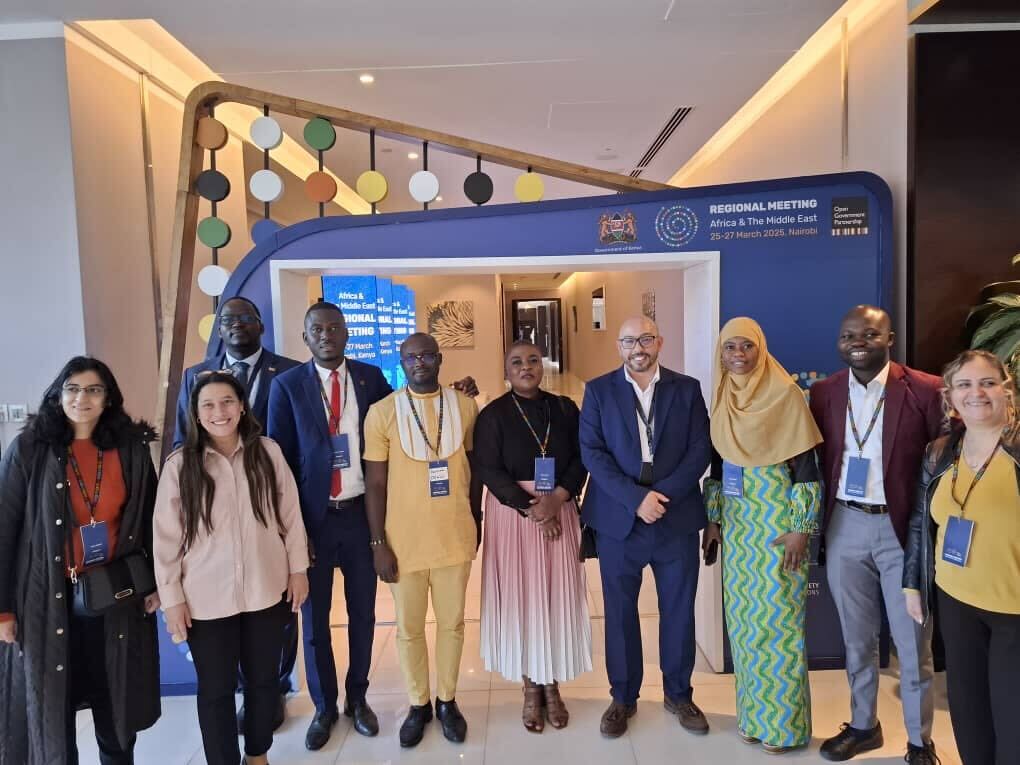
Official launch of the OpenDev Network at the OGP Africa and Middle East Regional Meeting in Nairobi, Kenya, March 2025.
Learning Together, Organizing Fast
In less than a year, the network has hosted over a dozen webinars, each drawing around 60 participants—from journalists and legal experts to public servants and student leaders. The focus is practical: how to ensure budget transparencyAccording to OGP’s Articles of Governance, transparency occurs when “government-held information (including on activities and decisions) is open, comprehensive, timely, freely available to the pub... More, what citizen participationAccording to OGP’s Articles of Governance, citizen participation occurs when “governments seek to mobilize citizens to engage in public debate, provide input, and make contributions that lead to m... More means in practice, and how to foster accountability at the local level.
“We don’t do events to impress,” says Malick Lingani of Burkina Faso’s Beog Neere. “We do them to be useful.”
A common thread across the network is technology.What ties these efforts together is a shared belief in the power of technology to democratize information and amplify civic voices. In Cameroon, ADISI runs OpenGovLoc, training youth in digital monitoring of municipal budgets. In Rabat, Samia El Baouchi works with civil society groups to adopt tools like participatory budgeting and open dataBy opening up data and making it sharable and reusable, governments can enable informed debate, better decision making, and the development of innovative new services. Technical specifications: Polici... dashboards.
All it took was a single webinar organized by Impact for Development that catalyzed the movement. Ten people joined the call. Today, there are hundreds. With the support of OGP, a monthly rhythm has taken hold, linking participants across geographies and causes. The issues they rally around—climate justiceTo address barriers that prevent citizens from having their justice needs met, OGP participating governments are working to expand transparency, accountability, and inclusion into all systems of justi..., genderOGP participating governments are bringing gender perspectives to popular policy areas, ensuring diversity in participatory processes, and specifically targeting gender gaps in policies to address gov... More equity, inclusionOGP participating governments are working to create governments that truly serve all people. Commitments in this area may address persons with disabilities, women and girls, lesbian, gay, bisexual, tr... More, and transparency—emerged from a network-wide survey.
“Now we have an action planAction plans are at the core of a government’s participation in OGP. They are the product of a co-creation process in which government and civil society jointly develop commitments to open governmen..., a roadmap we built ourselves,” says El Baouchi. “But we still need to grow. We need resources, training, and communication strategies that match the ambitionAccording to OGP’s Articles of Governance, OGP commitments should “stretch government practice beyond its current baseline with respect to key areas of open government.” Ambition captures the po....”
Staying the Course Amid Uneven Terrain
The network’s ambitions are clear. The road ahead is not.
Access to information remains unequal. Internet cuts and funding gaps persist. In many countries, political will is still hard to come by. Activist fatigue is real.
But the network endures because it addresses something essential: the need to build a public space that includes the excluded and values knowledge from below.
“Civil society can’t just oppose,” says Ndiaye. “It has to propose, to build. And we’re doing that step by step.”
What sets Open Dev Africa apart is its refusal to wait for top-down change. It is, instead, shaping a bottom-up infrastructure of openness, powered by collective memory, regional solidarity, and a sense of quiet urgency.
Telling the Stories That Matter
As Open Dev Africa becomes more organized in its approach, the next stop on the agenda is a portrait series. The purpose is not merely a communications tool, but to bear witness to the stories and struggles behind the movement. To document the lives of those involved. To humanize abstract policy debates. To show what open government looks like when it’s rooted in everyday experience.
“Each journey is singular,” says El Mekki. “But together they tell a story: that of a continent refusing to be sidelined.”
April 2025 saw the official launch in Nairobi. But it was more than a symbolic milestone. It marked a pivot, from emergence to consolidation, from conversation to coordination.
With ongoing support from OGP and interest from potential partners, Open Dev Africa is positioning itself as more than just a network. It’s a proposal. A vision. A claim that Francophone Africa has not only something to say about governance, but something to teach as well.
This blog is supported by the French Development Agency (AFD). The ideas and opinions expressed are those of the authors and do not necessarily reflect the views of the French Development Agency.
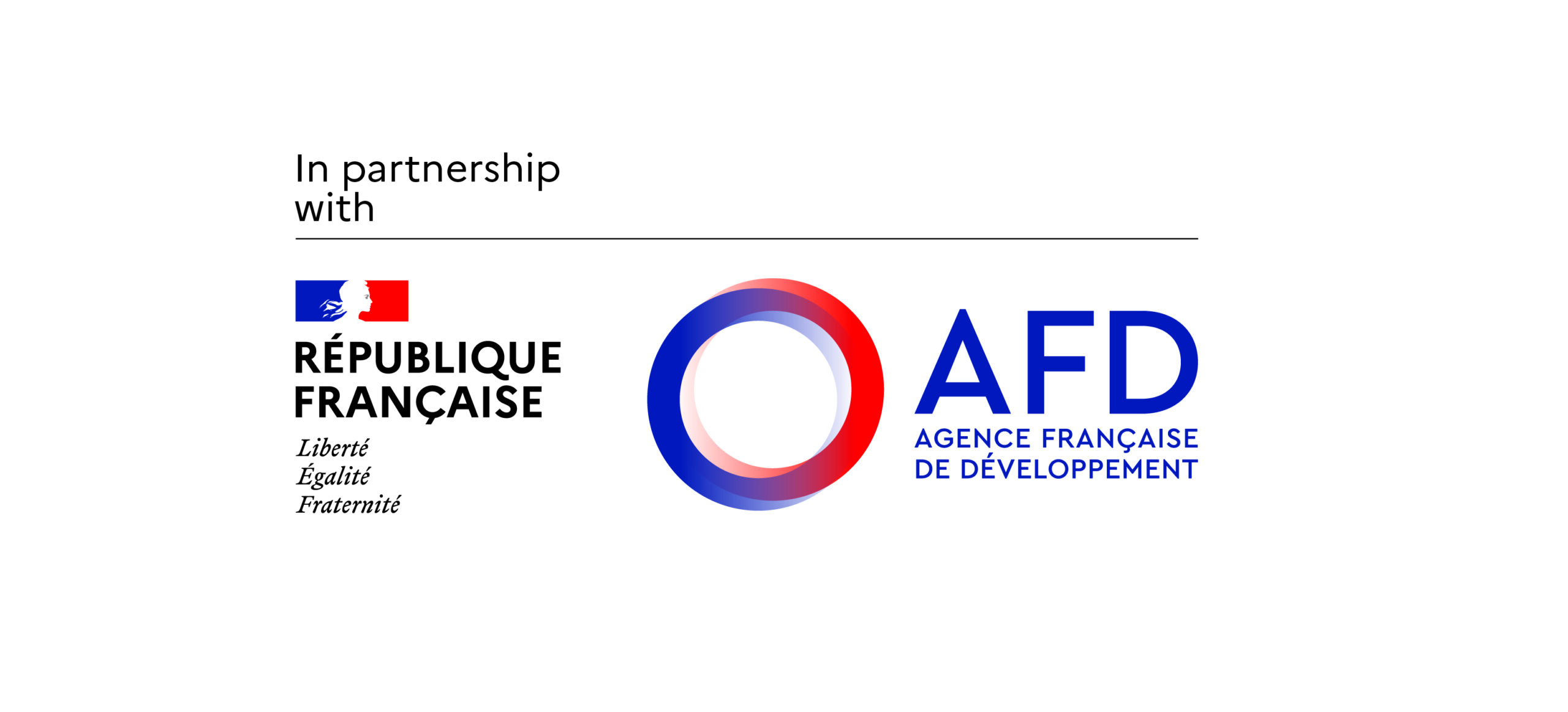
À première vue, ce ne sont que des groupes WhatsApp, des échanges Zoom et des Google Docs qui circulent de Dakar à Rabat, de Douala à Ouagadougou. En réalité, c’est tout un continent qui s’éveille à l’idée d’un gouvernement plus transparent, plus participatif, plus inclusif.
L’initiative s’appelle Open Dev Africa. Elle rassemble des centaines d’organisations, de collectifs citoyens, d’associations de femmes ou de jeunes, autour d’une ambition commune : faire entendre la voix francophone dans l’espace du Partenariat pour un gouvernement ouvert (PGO ou OGP en anglais) qui présente une forte majorité anglophone.
« Lors des premières rencontres continentales, le déséquilibre était flagrant. D’un côté, les pays anglophones avec leurs plans d’action bien rôdés. De l’autre, nos réalités, nos retards, mais aussi notre volonté de faire », raconte Abdoulaye Ndiaye, chargé de programme à l’ONG Article 19 au Sénégal. De ce constat est né un réseau informel, qui fédère aujourd’hui 700 membres répartis sur 21 pays.
Une dynamique horizontale
La coordination n’obéit à aucune hiérarchie fixe. Des groupes thématiques se forment, s’auto-organisent, proposent des idées de webinaires, rédigent des notes conceptuelles. L’ensemble repose sur le volontariat. « Ce qui compte, ce n’est pas le statut, mais la contribution de chacun », explique Mouna El Mekki, militante tunisienne et cofondatrice du réseau.
À l’instar des webinaires. Une dizaine ont déjà été organisés en moins d’un an, attirant à chaque fois une soixantaine de participants : jeunes leaders, militants, journalistes, magistrats, parfois des fonctionnaires. On y parle de participation citoyenne, de transparence budgétaire, de gouvernance locale. Un format sobre, mais efficace.
« On essaie d’être dans l’utile, pas dans la vitrine », précise Malick Lingani, président de l’ONG Beog Neere au Burkina Faso.
Le numérique comme levier
À Douala, le projet OpenGovLoc, porté par ADISI-Cameroun, forme des jeunes à l’usage du digital pour suivre les politiques publiques locales. À Rabat, Samia El Baouchi, coordinatrice du Réseau de la société civile africaine pour un développement ouvert, accompagne les membres du réseau dans l’adoption de mécanismes d’ouverture, parmi lesquels : consultations citoyennes, budget participatif, transparence des données.
C’est d’ailleurs à partir d’une initiative portée par Impact pour le Développement que le réseau a commencé à émerger : « Les thématiques sont toutes dans les principes d’ouverture de l’OGP. Notre premier webinaire avait réuni 10 personnes. Aujourd’hui, nous sommes 700 », témoigne Samia El Baouchi. Soutenue par l’OGP, l’initiative a permis de structurer un réseau autour de webinaires mensuels sur les axes prioritaires du gouvernement ouvert. Ses points forts : le partage et l’apprentissage, l’engagement communautaire, la synergie et le réseautage.
Mais des défis subsistent. « Il faut renforcer la communication, garantir la pérennité financière, et surtout miser sur la formation et le capacity building », recommande-t-elle. La communauté a identifié quatre sujets prioritaires : changement climatique, participation, genre et inclusion, et transparence budgétaire. Ces quatre thématiques majeures sont ressorties d’une enquête menée auprès des membres.
Un plan d’action est désormais finalisé, et le lancement officiel d’Open Dev, qui s’est tenu à Nairobi en avril 2025, a été présenté comme une étape structurante de l’initiative.
Une ambition discrète mais tenace
Le réseau avance à son rythme. Peu structuré, encore largement bénévole, il se cherche un modèle. « Il nous faut des soutiens, des partenaires, de la reconnaissance institutionnelle », glisse Abdoulaye. Mais il avance, porté par une conviction partagée : celle que la société civile ne doit pas seulement revendiquer, mais aussi proposer, construire, relier.
Les défis restent nombreux : absence de volonté politique dans certains pays, manque de financements, inégalités d’accès à l’information, coupures internet, fatigue militante. Pourtant, le réseau tient. Parce qu’il répond à un besoin. Parce qu’il comble un vide. Parce qu’il permet de sortir de l’isolement.
Des histoires à raconter
Pour valoriser les parcours de ses membres, le réseau prépare une série de portraits. L’objectif n’est pas seulement de communiquer, mais surtout de témoigner.« Ce que nous voulons maintenant, c’est raconter les visages du gouvernement ouvert africain », annonce Mouna. Le réseau prépare une série de portraits. Pas pour faire uniquement de la communication, mais surtout pour témoigner. « Chaque histoire est singulière, chaque parcours est différent », dit-elle.
Les lignes de l’avenir commencent à se dessiner. «Un plan d’action existe déjà, » affirme Samia El Baouchi. C’est un moment de bascule : celui où l’élan collectif cherche à se traduire en acte, où la voix francophone tente de se frayer une place durable dans les enceintes feutrées, et souvent verrouillées, du gouvernement ouvert.
Car c’est là, sans doute, que réside la force de cette dynamique : dans sa capacité à faire exister une autre narration de l’Afrique. Une Afrique qui, sans bruit, sans façade, travaille à rendre ses institutions plus justes.
Ce réseau a pu consolider son action grâce à l’appui de l’OGP qui l’a soutenu depuis ses premiers pas. Une étape clé pour structurer une mobilisation collective et faire entendre davantage la voix francophone dans les espaces internationaux du gouvernement ouvert.
Ce blog est soutenu par l’Agence Française de Développement. Les idées et opinions exprimées dans ce blog sont celles des auteurs et ne reflètent pas nécessairement les vues de l’Agence Française de Développement.

Comments (3)
Mohamed Elkhouaja Reply
That really sounds like a great initiative!
We are an ambitious association based in the province of Ouezzane, Morocco. We are currently working on a project focused on empowering children, youth, and girls in rural areas. We are also working to integrate coding and technology into our programs to help bridge the digital divide.
We would be delighted to join the Open Government Partnership and would love the opportunity to learn from other inspiring associations. Please feel free to guide us on how we can join the network.
Thank you for your support!
Alliant Chany SITCHEU FANI Reply
Chers membres….
Félicitations pour l’engagement en faveur de l’inclusion pour le développement et les OGP.
Je suis le Président du Regroupement Panafricain des Associations des Étudiants au Cameroun (RAEC) et nous travaillons sur des thématiques transversales l’OGP notamment la démocratie. https://raec-association.org/
Nous sommes intéressés à rejoindre votre réseau.
Nous restons entièrement disponibles pour tout supplément d’information.
En savoir plus sur nous ici ⤵️
Website : https://raec-association.org/
Facebook : https://www.facebook.com/profile.php?id=100069371600904&mibextid=ZbWKwL
LinkedIn : https://www.linkedin.com/company/regroupement-panafricain-des-associations-des-etudiants-au-cameroun-raec/
X: https://x.com/Raec122019?t=HFe1ctITV809WFifSjgKog&s=09
WhatsApp channel: https://whatsapp.com/channel/0029Va8kBqlCsU9L7omdYQ0L
Youtube : https://youtube.com/@raecassociation?si=n9mlbPzkcYp3Jk6I
Au plaisir
Alliant Chany SITCHEU FANI
President RAEC
Leave a Reply
Related Content
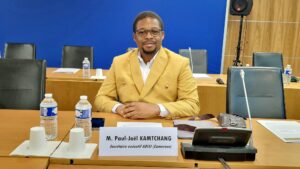 Champions
Champions Faces of Open Government: Paul-Joël Kamtchang
Paul-Joël Kamtchang is a data journalist from Cameroon and is the Executive Secretary of ADISI-Cameroon. On African Anti-Corruption Day, he offers insights on how open data enhances transparency and accountability…
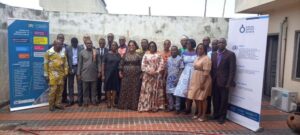
Co-Creation in Action: How Benin is Making Budgets Work for People
Learn how citizen action in Benin is turning open budgets into real change—from fixing textbook gaps to funding rural healthcare.
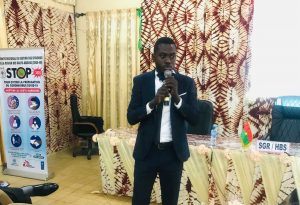 Challenges and Solutions
Challenges and Solutions Faces of Open Government: Malick Lingani
Malick Lingani tells us how organizations and international partners are helping French-speaking OGP members strengthen their open government efforts and other countries in the region get closer to joining OGP.

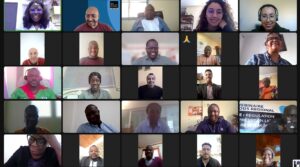
patrice Reply
Félicitation chers collègues